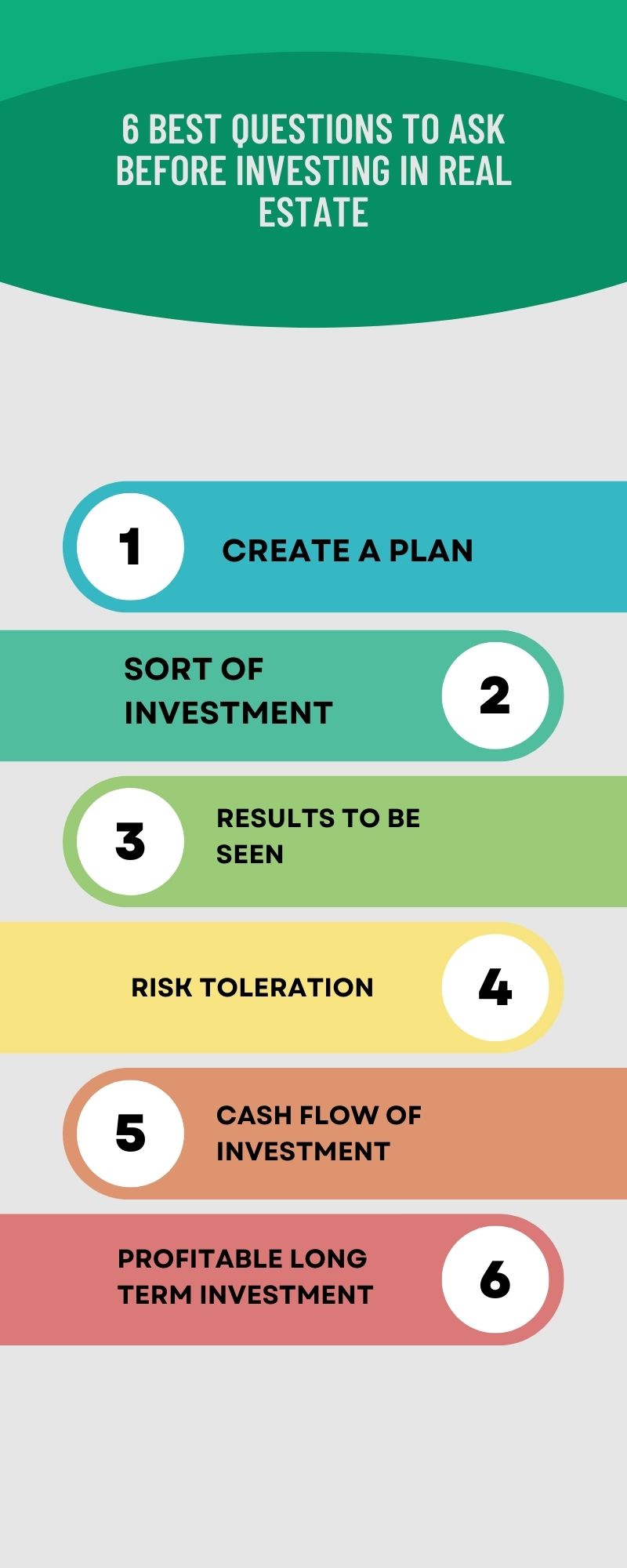
Are you thinking of investing in real estate? Actually, it is a super cool idea, as there is some add on in the income. One shall always plan for the extra sources, so that expenses of daily life are not dependent on one income, and the life goes on easily. One should have a backup prepared. Land is limited, so one should try investing in real estate.
Before putting big fat money in real estate, one shall know some questions.

1. How to create a plan, when investing in Real estate?
The three assessment approach is the easiest method for creating an investment strategy.
- Past debt or savings
Keeping track of your current savings is the first step. Additionally, this will display your spending history and assist you in changing your spending habits. Included in this section should be any debts that have an impact on your financial future.
- Current state of finances
You can assess your current financial condition based on your monthly income, cash outflow for loan repayments, and other monthly costs after taking note of your savings. When is the appropriate time for you to invest in real estate? That depends on your financial situation.
- Future Financial objectives
Last but not least, make a list of your financial objectives, such as other investment plans, children’s schooling, healthcare, insurance, other purchases, and anticipated wage increases.
You receive an estimate of the loan’s size and term, its interest rate, how long you want to hold the investment, and how it will affect your monthly spending.
2. What Sort of Investment one wants?
The real estate investing industry can be entered in a few different ways. For instance, real estate crowd funding enables you to make a small investment in both private residential and commercial properties. With the exception of picking a property and providing financing, this is a pretty passive type of investing.
On the other hand, flipping houses or renting out an investment property require significantly more involvement. You’ll have to worry about things like hiring contractors and supervising renovations if you’re flipping a house. Your time will be further consumed if you are completing the work yourself.
You take on all of the obligations (and hassles) that come with being a landlord when you own a rental property. In contrast to crowd funding or a real estate investment trust, you could hire a property manager to handle things for you, but you’ll still need to take a more active role in managing your investment. In the end, it’s preferable to base your investment choices on whether you’d rather be an active or passive investor.

3. After investing in Real Estate, When Will I Begin to See Results?
Buying mutual funds or trading equities are not the same as investing in real estate. The time it takes for your investment to pay off is generally going to be considerable. For instance, it can take five or even ten years for your investment to become profitable if you use a crowdfunding platform to fund equity investments. Real estate investing might not be your greatest option if you’re looking to become wealthy quickly.
4. What is the risk, which can be tolerated, after investing in real estate?
Any investment carries some level of risk, so before making a purchase, you should be clear on how much risk you’re ready to take. It’s important to remember that many types of risk exist when it comes to real estate.
You’ll be taking a big risk, for instance, if you want to flip houses. You’re making the assumption that by selling the house for a high enough price, you’ll be able to recover your initial investment and generate the kind of profit you’re looking for. If the market declines or if you exceed your budget, your profit margin can become very small or evaporate altogether.

The skyscraper
5. How is your investment’s cash flow?
The income from the property (rentals) and the amount spent on property management make up the cash flow in real estate. Wider profit margins enable upkeep with positive cash flows, making your investment self-sustaining.
To ensure a healthy cash flow, one must consider the following monthly costs.
- Local real estate taxes
- Home insurance premiums
- New state regulations
- Infrastructure, security, demography, connection, and other factors can affect costs.
When your property is vacant for an extended period of time or the rental rate isn’t favorable relative to your investment, negative cash flows develop. Examine such risk patterns to prevent additional losses, after investing in real estate.
6. Is long-term investment profitable after investing in real estate?
The estimated valuation of your investment is the last thing you need. Assessing the following factors is the best way to decide whether real estate is a wise investment:
How long should one keep investment? When is the best time to sell a profitable one?
Benefits of location, including whether the area is suitable for residents or employees
Property valuation: Higher the HPI of the city, higher the preference to investment in real estate. Verify whether the average property value in your area is increasing.
Facilities and amenities offered by the property: Millennial favor developments with top-notch amenities for healthy living. Maintenance and property management promote longevity.
Will potential tenants be attracted to the after investment in real estate?- alter your property in accordance with your intended audience, and the difference is seen after investing in real estate.
Conclusion:
The above mentioned key points should be remembered before and after investing in real estate. Because one wants whooping profits from the investments done.